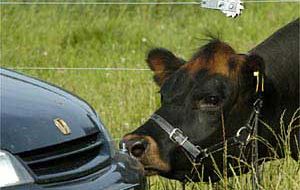MercoPress. South Atlantic News Agency
Livestock responsible for 18% global gas emissions says UN
 Causes and effects of a greehouse gases threaten agriculture
Causes and effects of a greehouse gases threaten agriculture A senior United Nations official called this week for action not only to tackle the causes of global warming by reducing greenhouse gas emissions but also to cope with its effects such as the increasing vulnerability of agriculture which places developing countries especially at risk.
Abnormal changes in air temperature and rainfall and the increasing frequency and intensity of drought and floods have long-term implications for the viability and productivity of world agro-ecosystems, UN Food and Agriculture Organization, FAO Assistant Director General Alexander Müller told over 140 world experts convened in Rome for a workshop on Adaptation Planning and Strategies. "FAO is already actively assisting its members, particularly developing countries, to enhance their capacity to confront the negative impacts of climate change on agriculture, forests and fisheries," Mr. Müller said, noting that this means helping people to adapt their agricultural systems to changed conditions and specific stresses. This involves providing creative solutions and alternative approaches, such as introducing crop varieties that can tolerate heat and water stress, he added, calling for greater attention to forecasting extreme events and trends by collecting data and developing tools to produce on-hand information for adapting countries' agriculture. Ways must be found to build up the resilience of people and of food production systems, he said, noting that agriculture – the sector most affected by changes in climate patterns – will be increasingly vulnerable in the future. Especially at risk are developing countries, which are highly dependent on agriculture and have fewer resources and options to combat damage from climate change. In the short term, as the global average temperature rises 1-3º Celsius, industrialized countries may well gain in food production potential, but at lower latitudes, especially in subsistence sectors, marginal, semi-arid and sub-humid regions where rain-fed agriculture is the norm, crop potential will most probably decline even with a minimal rise in global temperature, according to FAO. Agriculture is both culprit and victim when it comes to climate change. It is estimated that the livestock sector alone accounts for 18% of global greenhouse gas emissions, while deforestation is responsible for 18% of carbon dioxide emissions. According to FAO, introducing improved livestock management and crop practices, coupled with adaptive management of forests, could have a very significant impact. Adopting land-use practices such as conservation agriculture would also help to maintain significant amounts of carbon in the soil. Rice production is another major source of greenhouse gas emissions. It is perhaps the main source of anthropogenic methane, with some 50 to 100 million metric tons per year emitted from the world's 130 million hectares of rice paddies, the agency said. At the same time adverse and extreme weather conditions can jeopardize rice crop production, which feeds more than half the world's population. A major benefit could be achieved by introducing different and improved rice varieties with greater salinity tolerance. These were successfully used by FAO to expedite the recovery of production in areas damaged by the 2004 Indian Ocean tsunami. The rapid transition toward greater use of bio-fuels could also help to reduce greenhouse gas emissions, so long as food security and environmental considerations are taken into account, FAO said. The workshop has been organized by the Secretariat of the UN Framework Convention on Climate Change and is part of a series of meetings to assess strategies to cope with the effects of global warming.




Top Comments
Disclaimer & comment rulesCommenting for this story is now closed.
If you have a Facebook account, become a fan and comment on our Facebook Page!